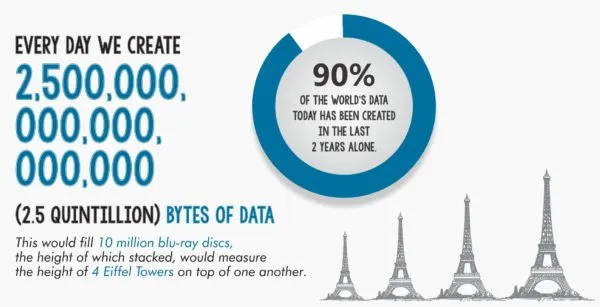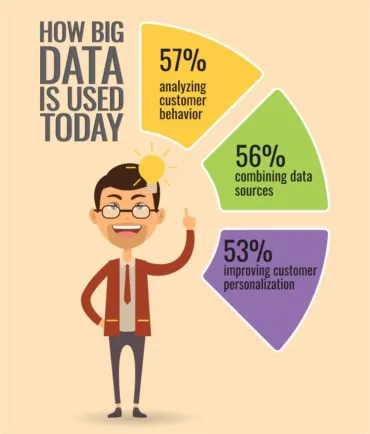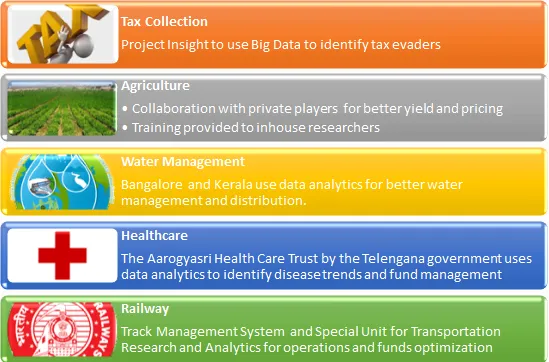How Data Intelligence and Analytics are changing the Indian business landscape
The amount of data being collected worldwide is increasing exponentially, so much so that almost 90 of the global data has been generated in the past two years alone All of this strengthens the claim that we are currently in the age of Big Data. Simultaneously, many related fields like Data Science, Data Intelligence, Artificial Intelligence, Machine Learning, and Deep Learning have also seen a lot of growth and are revolutionising businesses and industries across the globe, thus, making the market an increasingly competitive one. And the only way to ensure that your company or organisation continues to remain a part of this competitive market is why organisations today are on the lookout for skilled data scientists and data professionals.
While data lies at the core, data intelligence and data science are two different concepts and it’s important to understand the difference between data science and data intelligence.

Data Intelligence vs. Data Science
Data intelligence pertains to the analysis of data sets to obtain valuable insights that can benefit organisations and businesses in many ways such as scaling up revenue, minimising operation costs, improving the decision-making process and customer experience, and so on.
Data intelligence is all about processing, analysing, and visualising data to extract insights from it using conventional methods like dashboards and other data management tools.
Data Science, on the other hand, involves a more complex approach towards data – it uses statistics and predictive analytics to uncover the hidden patterns and trends within the data. In other words, data science can be considered as an upgraded form of data intelligence that uses more sophisticated statistical tools and use-cases to analyse data and make predictions accordingly.
Data Science – the emerging field
The focus of data science is to delve into data to unravel useful insights and use those insights creatively to drive the growth of businesses and organizations. As more and more enterprises continue to join the Big Data bandwagon, the demand for skilled and trained professionals such as data scientists, data architects, data analysts, and data engineers is on the rise. Harvard Business Review maintains that the job of a Data Scientist is “the sexiest job of the 21st century.
However, surprisingly the demand for data scientists is way higher than their supply. In 2012, Gartner predicted that by 2020, the shortage of data scientists would scale up to 100,000. Further, in 2014, Accenture found that despite 90 percent of its clients being willing to hire data scientists, over 40 percent of them stated that talent shortage was a hurdle here. Estimates suggest that by 2020, India will face a demand-supply gap of a lakh data analytics professionals. One of the primary reasons behind this talent shortage is the lack of a proper, and all-comprehensive training.
Since most companies look for individuals with versatile talents, it is essential to have a good background in data science.
With the Internet being the greatest learning asset at our disposal, Massive Open Online Courses (MOOCs) can be an excellent way to gather knowledge in data science. Many online platforms provide a variety of data science courses that can help you acquire the right combination of skills and talent within a short span of time. Not only do these programmes allow free and unrestricted access to relevant study materials, videos, and lectures, they also give the students a certain degree of flexibility to learn according to their own terms and convenience.
But how do data science and data analytics impact businesses? Let’s have a look!
The role of analytics in business
Business Analytics comprises of the technologies, applications, skills, and practices that businesses utilise to explore data to discover insights that can optimise business operations with data-driven business decisions. Precisely, analytics in business refers to a combination of the factors mentioned above to design such applications that can facilitate particular business outcomes.
The most commonly used business analytics techniques include data mining, statistical analysis, quantitative analysis, predictive analytics, and artificial intelligence, to name a few.
Today, analytics has become an integral part of the business world due to the versatility and accuracy of the outcome that it promises. Let’s look at how analytics is transforming businesses.

Enhancing business operations
With the help of an organization’s historical data, analytics can bring about a considerable improvement in business operations. One of the most significant cases of analytics lies in monitoring and improving your company’s KPIs (key performance indicators). You can always track how your marketing strategies are doing with analytics.
Improve customer relations
Analytics allow you to see which campaigns, marketing strategies, and offers are a hit with your customer base. It will also track customer interactions and offer insightful advice on how you can improve your customer acquisition and retention strategies.
Boost sales and revenue
Analytics can help boost sales by allowing you to understand the needs of your customer, stay updated with the current market trends, and see what kind of content, ads, and campaigns are being used by your competitors to attract customers. These insights will help you improve your product and re-adjust your sales strategies, thereby increasing the overall revenue.

Today, we not only have a lot of data, but also a number of interconnected devices generating that data. Yes, we’re talking about the Internet of Things. Let’s look at how IoT is helping organizations improve their services.
Big Data and IoT
With over 8.4 billion connected devices worldwide, one can only imagine the amount of data being generated every minute on a global scale. Connected devices that are a part of the Internet of Things (IoT) are providing a major boost to the Big Data industry, as it is evident that more the number of connected devices, higher is the amount of data generated every minute.
IoT has given organisations the power to improve their customer services by personalising everything more than it was possible a decade ago. McDonalds is perhaps the best example of this. Collaborating with Piper Beacon Technology, McDonalds has changed the way customers win offers and prizes. Now, powered by Piper’s technology, McDonalds greets customers by sending them customised coupons, offers, and other related information on their mobiles.
IoT helps customers get a better understanding of an organization’s products/services as it drives customer-brand interaction. This allows you to see how your customers are interacting with your brand. Amazon is using Amazon Dash Buttons to experiment with this approach by clicking on relevant Dash Buttons.
With so much said and done, it’s only fair to conclude by saying that if data, numbers, and analytics excites you, the field of Data Science and Analytics is tailormade for you. Also, like we said earlier, organisations today are constantly looking for a upskilled data professional. So there couldn’t be a better time than now to begin your journey and take the first flight.
(Disclaimer: The views and opinions expressed in this article are those of the author and do not necessarily reflect the views of YourStory.)







